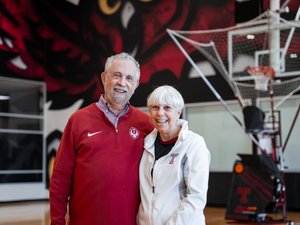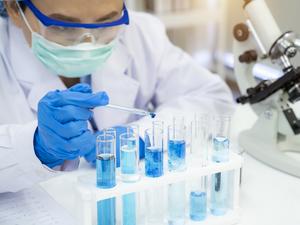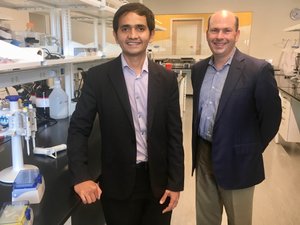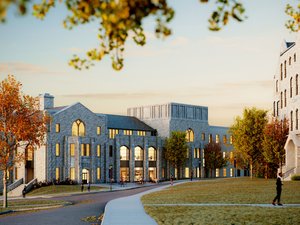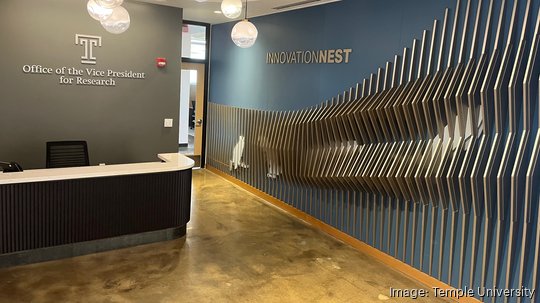
Could North Broad Street be the city's next innovation corridor? Temple University is betting on it with iNest, a new incubator space the school hopes can ignite innovation in North Philadelphia.
The project spans 8,000 square feet of lab, co-working, office and event space inside Temple's former dental school building at 3223 N. Broad St. The incubator is meant to be a catalyst for innovative research, commercializing ideas and producing startups, much like University of Pennsylvania's Center for Innovation.
Temple officials say iNest's focus will likely gravitate toward health care industries with its location on Temple's health sciences campus near the Temple University Hospital. Companies are able to take space in the iNest if they have an established connection to Temple, but don't necessarily have to be spun out of the university.
Josh Gladden, the university's vice president for research, sees an opportunity to replicate what's happening in University City and take life sciences innovation specifically "to the next level."
"I do think that that won't just be limited to the University City, West Philadelphia area," Gladden said. "There are expansion opportunities in the North Philly area that will also leverage some of the strings that Temple has versus some of the other institutions. . .We have a lot of history in working deeply with patient populations and we understand that part."
Temple officials hope the suite in the former dental school building won't be enough to contain iNest's impact. They see opportunity for iNest to be a key cog in potentially fostering more innovation-focused development in North Philadelphia. It's happened in University City, where the University City Science Center helped spur projects like uCity Square or Penn Center for Innovation with Pennovation Works.
"There's some development opportunities moving down the line that, I think collectively, we see opportunities to grow that technology ecosystem in that North Philly area with the health science campus as kind of the center of gravity of that," Gladden said. "I think we can all agree that North Philly has a lot of underutilized real estate up there and there's a lot of opportunity up there. There's a lot of challenges too, I think we all know that. But I think Temple is well positioned to be at least a center of gravity to start building that out."
Temple currently has 28 active companies that are spun out of Temple research that have raised over $180 million in the past three years, according to Stephen Nappi, the university's associate vice president for technology commercialization and business development. Those spinouts include Thrombolex, UprightVR and Excision BioTherapuetics.
Nappi said the university has seen "momentum already built" with Temple spinouts going to market. The school wanted to give those startups a base to conduct research, but also be a space for research that could lead to more Temple startups.
"What we wanted to do here was consolidate all the resources that are available to support that community, but also be there for the next generation and the new companies that will be spinning out moving forward," Nappi said.
New Orleans-based Muse Engine, a 3D printing company, will be the first tenant. Muse's COO, Jennifer Vondran, was a professor at Temple.
The iNest carried a buildout cost of $5 million with more than half of the funding coming from grants. Temple secured money from the Pennsylvania Redevelopment Assistance Capital Program, the Commonwealth Universal Research Enhancement Program and the Sbarro Health Research Organization. Temple will budget additional funding for programming from its office of the vice president for research.
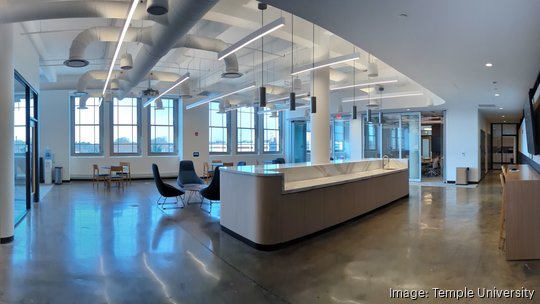
The space is set up to flow based on the stages of startup creation. The first "zone" in the iNest is its commercialization suite, which is a full-service support team for researchers meant to be a starting point for turning ideas into marketable products. Next is an innovation forum where the iNest can host luncheons or pitch events at a space called "the Hatchery," for example. That area can also shift to accommodate larger events as well.
The remaining space, more than half of the iNest, is its incubation zone. That includes offices, hoteling space, common areas and conference rooms. It also includes wet labs along with gene sequencing, cell culture and computational rooms.
In terms of programming at the iNest, Nappi and Gladden said that it will host partnership events like technology showcases, or training and workshop sessions for young entrepreneurs looking to start a business. They also plan to launch accelerators, likely with external partners, though Nappi declined to disclose who those could be.
Penn and Drexel University have cemented their role on the forefront of Philadelphia's innovation scene, now Temple is looking to join them. Gladden said he looks at the dynamic less as competition, but more so as an opportunity for more cross-institution collaboration.
"What Penn has, what Drexel has is important, and they should be moving forward. It's great for the city, it's great for society," Gladden said. "But what Temple has is also important. That is a piece that we can add to their pieces and really make that vision of all of the Philly region being a driving factor on a national, international scale for biomedical innovation."
